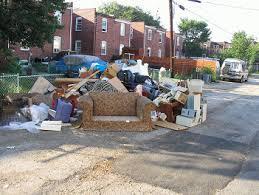 A trivial incident — kids throwing snowballs at a car. Next thing you know, Arleen, a single Milwaukee mother, is evicted. Sheriff guys give her a choice: all her stuff dumped on the sidewalk, or taken to storage, where she can pay $350 to reclaim it.
A trivial incident — kids throwing snowballs at a car. Next thing you know, Arleen, a single Milwaukee mother, is evicted. Sheriff guys give her a choice: all her stuff dumped on the sidewalk, or taken to storage, where she can pay $350 to reclaim it.
Arleen doesn’t have $350.
So begins Matthew Desmond’s book, Evicted: Poverty and Profit in the American City.

There seems to be an idea that housing is somehow “out there,” like handed down from God, with landlords sort of leeching onto it to suck profit. Not that housing is a good that landlords provide to tenants, earning some just compensation for their investment and efforts.
But a few pages into the book we meet Sherrena — a black woman of middle years and Arleen’s landlord. And just as Desmond does depict the trials and tribulations of renters, so too does he show those of landlords. “Profit?” Maybe — if they can manage to overcome all those things that can and do constantly go wrong. (I’m thankful to have my own different and very smooth business.) In the landlord-tenant relationship, it was often arguable who was “exploiting” whom. The “system” has a lot of aspects hostile to landlords. In Milwaukee, if there are more than three 911 calls in a month, the landlord faces fines, property forfeiture, and even jail. She has to file a plan for “abating the nuisance.” Usually that means eviction.

New York has actually had a “Rent is Too Damn High Party.” And that theme seemed to pervade Desmond’s book, with poor people paying high proportions of their incomes in rent. Implying this contravenes social justice. The author even notes that rents for wretched slum dwellings are not greatly lower than for nice one ones in better neighborhoods.
So are the poor being gouged to subsidize better-off tenants? Of course not. As the book shows, slum apartments actually entail a lot of operating costs landlords don’t face in nicer areas.

In the final analysis, this is a highly competitive free market, with multitudes of suppliers, and rents determined by supply and demand. I kept wondering: if profits are so great, why aren’t guys rushing to build more apartments? (Expanding the supply, which would drive down rents. That’s how markets work.)
But again, being a slumlord is actually a fraught business. A lot of it is due to the life dysfunctionality rampant among lower income renters. The picture is sadly familiar from books like Hillbilly Elegy and Our Kids. Drugs, alcohol, lack of education, casual violence, marital/family/relationship chaos, and much involvement with the criminal justice system. It’s wrong to blame the poor for their poverty. Anyone born into such an environment is greatly handicapped in life from the start. Yet in so many of Desmond’s stories, folks make some really bad choices. He offers the psychologically understandable explanation that, with lives full of difficulty and uncertainty, poor people tend to prioritize the “now” over the future, while also withholding their full energies from today’s problems, to keep some in reserve for tomorrow’s.
Yet there’s actually a simple, almost foolproof formula for avoiding poverty: finish high school (at least), don’t have kids before you do, and stay sober. Easy to say, hard to do, if you’re born into poverty.
Desmond makes a good case that the eviction problem is huge: poor Americans just cannot afford market rents.


One seemingly obvious answer to the mess that is the housing picture for poor people is for the government to step in and, instead of trying to regulate the market, to simply provide housing itself. In fact, we tried that; it proved a massive disaster. So nowadays the government’s intervention largely takes the form of “Section 8” vouchers, paying part of some poor tenants’ rent. Though Desmond notes the voucher amounts are calculated by reference to average rents in an area — including both slums and nice districts. Thus they’re above the average for slum housing — seemingly a windfall for landlords. (On the other hand, many landlords refuse to accept “Section 8” tenants.)

Desmond doesn’t mention this either, but for all the chatter about “affordable housing,” cities typically defeat that by also restricting supply through zoning rules, height and density limits, etc. A study by economists Tang-Tai Hsieh and Enrico Moretti estimates that removing such restrictions in just three cities (NY, SF, San Jose) could boost U.S. GDP by 9% by enabling more people to live in them. Some cities have made a “grand bargain,” removing building restrictions in exchange for requiring developers to offer some units at below-market rents.
Desmond’s main recommendation is to expand the voucher program to simply cover all families below the 30th income percentile. He cites a 2013 estimate that this would cost $22.5 billion nationwide, even without changing the averaging formula that he says favors landlords, and without considering offsets like less homelessness with its associated public costs. That $22.5 billion is hardly more than a rounding error in a federal budget with trillion dollar annual deficits.

A better approach would actually go further: ditch all the Rube Goldberg welfare programs (and all the huge bureaucratic costs they entail), supplanting the whole mess with one simplified program: a guaranteed annual income.
This would face up to a growing reality. Increasing technological sophistication makes the world richer, but many people are left behind. Simple humanity demands sharing with them a part of those riches. We can afford it. The cost would be a fraction of what’s spent for far less compelling purposes.
Advertisements